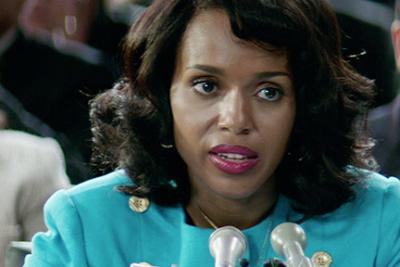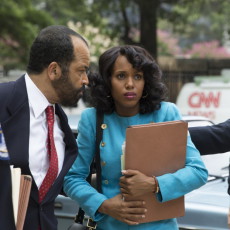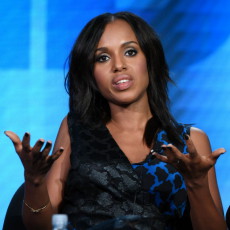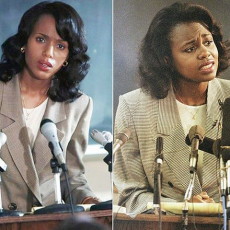Q&A with HBO's CONFIRMATION Star Kerry Washington
Maj Canton - April 15, 2016

This Saturday, April 16, 2016 at 8pm ET/PT, HBO premieres CONFIRMATION, the story of the 1991 confirmation of Judge Clarence Thomas to the Supreme Court. Over 50 million people watched live on television as the Senate Judiciary Committee, under the chairmanship of Senator Joe Biden, investigated allegations by law Professor Anita Hill that Judge Thomas had sexually harassed her 10 years earlier when she worked for Thomas as a young attorney. The hearings were a cultural phenomenon and became a turning point in workplace equality and gender politics. Starring Kerry Washington, Wendell Pierce, Greg Kinnear, Jeffrey Wright, Eric Stonestreet, Jennifer Hudson, Grace Gummer and Treat Williams.
While the whole "he said, she said" affair turned into a scandal at the time, CONFIRMATION is no over-the-top "it's handled" Olivia Pope melodrama. Washington gives a tightly controlled, masterful performance as Anita Hill in this riveting telefilm.
|
|
This past January at the Television Critics Association (TCA) Winter Press Tour, HBO presented a CONFIRMATION press panel that included star and executive producer, Kerry Washington. Here are a few highlights (edited for clarity and readability) from that panel.
|
|
 |
Answer: We all talked about how it was such an important moment in our country. It was one of the first times that we all stood still and began to partake in what we now think of as a 24-hour news cycle. You know, we never think twice about it now. But we didn't engage in public affairs in that way in the early '90s, in '91. So these events really transformed the way we even consume news. I was 14 when it was originally happening, but I was in a household with an academic. My mother was an academic who had very passionate feelings about it as a woman of color. My dad had very passionate feelings about it as a black man. And I was immersed in how complicated and how complex the issues were from a very young age, and it always stuck with me how passionate both of my parents were and how differently they looked at the situation. And so that was part of what was important for all of us in the making of this film, is that we really courageously stick to the complexity of the situation and not try to one-note any character or any one moment of this process. |
|
|
|
|
|
Kerry Washington at TCA. |
Question: After working on this film are you more or less cynical about Washington, given SCANDAL? Answer: I think I'm really inspired by the difference that a person can make in Washington and the kind of cultural shift that happened after the events that take place in our film. I think it's really inspiring to think about how much changed, how we were all transformed by these events in terms of our language changing around sexual harassment, around victims' rights, around how we think about the workplace, how we think about women, how we think about race, how we think about power. So I think I'm a person who tends to be more inspired than cynical, so that's my takeaway. |
|
Question: In retrospect how do you feel about the outcome? Answer: One of the goals, in making this film was to continue the conversation. Because one of the most important things that happened as a result of these hearings was that it changed not just the national but the global conversation, and that is an outcome that we all felt was really important, and we wanted to make sure that that conversation continues, because some of those issues have evolved enormously. We all had to sit through a sexual harassment orientation before we started filming the movie, which was a little bit surreal, because we knew why we were having that orientation, based a lot on the story we were about to tell. And yet some of the issues are still rearing their head in terms of gender and in terms of race and how we understand those things. So I think, really, the outcome of what happened was that the conversation began and we want to make sure that that conversation continues. I think the assumption is that the movie is sort of like, "who's telling the truth,?" who did you believe?" And that is a very provocative question. But one of the things that we learned that was most exciting was when you start to tell this story and you pull back the curtain, the story is way more complicated than just he said, she said. |
|
|
|
|
Kerry Washington (left) and Anita Hill (right) testifying. |
Question: Anita Hill has been notoriously private. Have you met her? Did you get a chance to speak with her at all? And did you have any fear or trepidation going into this, playing this character? Answer: Yes, I have met her, and she is very private. I felt that that was something that she and I shared, that idea of the circumstances of your life thrust into the public eye, when it's not necessarily your choice. That was something that we really were able to bond on. And, yes, I was very terrified; portraying somebody who's real is a different kind of responsibility, especially when they're alive. So that significance was not lost on me, both as an actor and as a producer, wanting all of these characters to feel real and to matter as much as these people do.. |
|
Question: You mentioned that you bonded over the fact that circumstances had pushed you both in the public eye. How have you learned to navigate those circumstances yourself? Answer: I wish that I had the level of elegance and grace that I think Anita did, I wish I had that in the beginning, but I just keep trying to learn how to live a public life and still have some private space. But there are lots of great role models for it. And so it's just sort of figuring out as we go along. |
|
|
|


